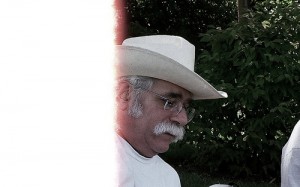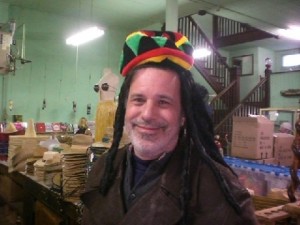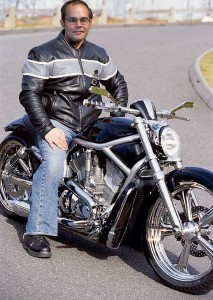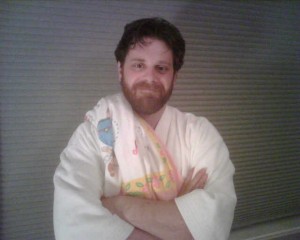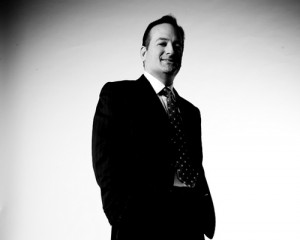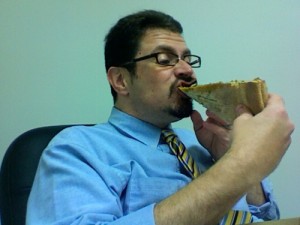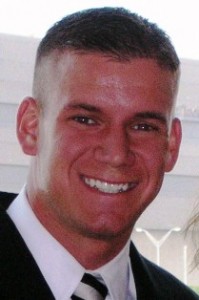Blawg Review #296: Images From The Criminal Law Blawgosphere
A professional photographer and artist once told me the story about trying to photograph his mother. He had hoped for a candid shot, and was initially resistant when she insisted on fixing her hair and putting on makeup first. On thinking about it further, he decided that an arranged photograph would say far more about his mother than any spontaneous image. A candid shot may show what the person happens to look like at that particular moment. But, by allowing the subject to play a role in staging the photograph and thus revealing how the subject would like to portray herself, the staged shot provides much more insight into who the subject actually is.
I thought about the photographer’s story as I was reading entries and trying to develop a theme for this week’s Blawg Review. I was intrigued, for example, by some of the photographs the blawgers choose as their public face: Did they go for the formal headshot? A more informal shot in casual clothes? Did they smile or adopt a serious expression?
For blawgers who chose such a professional shot, I was interested in obtaining an alternative image, something regular readers of their blawgs may not have seen before. Unlike the more staged pictures of the photographer’s mother, the only insights offered by the formal headshots many of us use on our websites are insights into the photographer himself. It is, after all, the photographer who tells the subject how to hold his head and where to look. I was also intrigued by the blawgers who don’t use any photograph at all, and decided to track down photographs of blawgers whose images are not readily available on the Internet.
Because the best blawgers all speak with a distinctive voice, my purpose in doing all of this was to try to make a connection between the image and the voice. Where you don’t have a mental image of the blawger, your mind tends to fill in the details as you listen to the voice. It is almost like going on a blind date: You want to know if the image of the blawger matches your expectations.
I begin with Jeff Gamso, who by all accounts is one of the best blawgers in the criminal defense field. A self-described ACLU and anti-death penalty guy, Gamso writes passionately and persuasively about these issues. Gamso is a former English professor, and he knows how to begin his entries with a hook. Opening lines from blog entries this week alone include: “Violence is as American as cherry pie” and Nobody wanted him to be killed. Well, almost nobody.” Or: “You think you can stop killing by banning handguns. Think again.”
That Gamso was extremely reluctant to provide me with a photograph also says something about Gamso’s modesty and humility. Mark Bennett pointed out six months ago how Gamso didn’t even mention his role in getting the Ohio Supreme Court to strike down as unconstitutional the state’s sex-offender-registration statute. As Bennett put it: “Most lawyers will never get a statute held unconstitutional. If I ever do, you can bet I will let you know it.”
Gamso posted this week about the use of an unmanned “spy blimp” for police surveillance in Ogden, Utah. He wrote about Leroy White, a man on death row in Alabama whose inexperienced lawyer missed a critical deadline for federal court appeal. He also offered a mea culpa to Judge Stacy Cook for mischaracterizing some of her actions.
Scott “Get Off My Lawn” Greenfield is famous in the blawgosphere for his curmudgeonly ways. Although I have always admired his writing, it did take me a while to understand and appreciate his crankiness. In nominating Simple Justice for the ABA Blawg 100 for 2010, Nathaniel Burney of Criminal Lawyer probably put it best when he said that Greenfield “has no patience for whiners, entitled millenials, and those who think Twitter and Web design are substitutes for experience and ability.” But, Burney added, “even when he’s seemingly on a rant, you can’t help but feel he’s winking at you.” Mark Draughn of Windy Pundit has also written a clever piece on how to survive Greenfield.
Of the options available to me, I chose a candid photograph of Greenfield dressed like a Rastafarian, which I think was taken by Eric Turkewitz of New York Personal Injury Lawyer, because it shows a lighter, almost playful side to Greenfield.
Greenfield posted this week about, among other things, free consultations and Internet reputations and about suing your lawyer for malpractice as opposed to claiming ineffective assistance of counsel. He wrote also about the differences between the “practical blawgosphere” and that inhabited by law professors:
Over time, I tried to engage with the lawprofs, as I often found their posts provocative and their insights interesting. Not all practicing lawyers did, but that was my take. Sometimes I would write posts that praised an idea; other times not so much. At first, they would comment when I disagreed with them, defending their honor in the blawgosphere. After a while, most stopped, realizing that there was nothing good in it for them, as I was not on their tenure committee, not inclined to show them the deference they expected from a student and, as practicing lawyers sometimes are, blunt in my responses.
The lawprofs didn’t really like interacting with practicing lawyers. They have a language and tone that is mandatory in the Academy, where no feelings are ever hurt and no harsh words ever uttered. Practicing lawyers tend to be a bit rougher around the edges, using words that no scholar would ever utter. They found us offensive and coarse. We made their eyes burn when they read our words.
They wouldn’t tolerate our rude ways, and withdrew again. Some called it circling the wagons. Others, a circle jerk. Either way, they pulled up the drawbridge and headed for the castle keep, where no harm from the outside could touch them.
While I had originally referred to the “criminal defense blawgosphere ” in the title to this Review, I changed that to “criminal law blawgosphere” when I realized that the former title would not encompass my favorite prosecutor, Mark Pryor of DA Confidential. A reader here once expressed concern that I had blown Pryor’s cover when I mentioned his name in connection with the DA Confidential blawg, but Pryor himself has said that it is no longer any secret who he is. Besides, as Pryor has also noted, the whole mystique of the DA Confidential was merely a clever conceit suggested by one of his friends. Pryor posted most recently about the banning of a plastic toy gun from a transatlantic flight.
Jacquelyn Carpenter wrote a gripping piece last July about the humiliation of being arrested. Based on her own encounter with an overzealous police officer, the whole “insulting, demeaning, hurtful, scary” experience afforded her new insight into an experience our clients know all too well. This week Carpenter posted another entry based on personal experience, this time as a government witness in a misdemeanor assault case. After being jerked around by the prosecutor during the filing and then re-filing of the case, hours of sitting in a courtroom waiting for the case to be called left her similarly disillusioned:
All in all, this was a total and complete waste of my time. At the very least, appreciate the fact that I am three blocks away and allow me to continue working from my office. We try cases and put people on call all the time. I am presently sorry that I admitted I witnessed anything; I should have kept my mouth shut and looked away after the incident. This all feels like punishment.
The photograph on the blog that Carpenter writes with her colleague, Eric Davis, depicts the two of them standing back-to-back with arms folded across their chests. For the purposes of this Blawg Review, I chose the more informal photograph of Carpenter in sunglasses that she uses for Twitter.
While Norm Pattis does not always play by the rules of the blawgosphere (very rarely, for example, does he link to other sites), there is no one who writes any better than he does. I can never escape that “gee, I wish I had written that” envy every time I read one of his entries.
His independent streak, I think, is captured nicely by the photograph of him corralling sheep on his farm in Connecticut with the help of Odysseus, one of his two border collies. Writes Pattis in response to something another blawger has posted: “I matter to my wife, my clients, my kids and my dogs. Beyond that, I rail at the wind, and plan to keep screaming until I drop. The rest is chance and circumstance.”
Pattis wrote this week about proposals to reduce the cost of dealing with sex offenders and about reducing the cost of jury trials through the elimination of the “individual sequestered voir dire” currently used in Connecticut. Having fielded many calls from “folks in harm’s way,” Pattis also discussed the possibility of setting mandatory minimum fees for criminal defense work:
I’ve heard stories of hungry lawyers agreeing to represent folks charged with serious felonies for $500. It is difficult to comprehend how such a fee can be adequate. Much though I shudder over the thought of bar regulators setting fees, it does not offend to consider the possibility of mandatory minimum fee structures. In a tight economy, the race to the bottom will often yield lawyers who have undertaken representation of a case without a fee sufficient to assure that the lawyer pays attention to the file. The result in such cases will be claims of ineffective assistance of counsel and a loss of confidence in the integrity of the criminal justice system.
Only a couple of years into his practice, Matt Brown writes about the challenges facing a new criminal defense practice, including, for example, the problems with filling in for other lawyers and the perils of relying on a listserv. His most recent entry focused on the inaccuracies of a TV show called Harry’s Law and the distorted message it sends to the public about the criminal justice system:
I’m embarrassed I suffered through the whole show, but I’m also angry it ever got made. Its general terribleness aside, it sends the worst possible message to the public. Its message is far more harmful than the typical good-versus-evil, prosecution-versus-defense message sent by similar shows. Showing the system from the perspective of the defense lawyer and humanizing the people we represent is good. Making it look like everything is okay and telling the public things turn out right in the end is most certainly not good. It isn’t just bad TV; it’s probably representative of a big part of the reason why people in this country couldn’t care less about the injustice of mandatory sentencing provisions and other unfair features of our criminal justice system. They don’t know it exists.
With his unbending commitment to the best interests of criminal defendants, both his own clients and the clients of other lawyers, Mark Bennett can occasionally come across like a Presbyterian minister. I like the Hitlerian photo that Bennett posted of himself because it shows that Bennett, despite this commitment, still doesn’t take himself too seriously. Bennett completed a series of entries this week, beginning on January 12, that oppose proposed amendments to the Texas Disciplinary Rules of Professional Conduct and what Bennett calls the “State Bar of Texas’s war on flat fees.” Bennett doesn’t just complain about things; he also has concrete suggestions for improvement.
Paul B. Kennedy has been a fairly recent discovery, at least for me. Kennedy joined Bennett and others in opposing the proposed new disciplinary rules for Texas. He also wrote this week about DUI and alcoholism, get-tough judges who think they are prosecutors, and a proposed “rocket docket” for Harris County.
Although Gideon’s piece on prison conditions won this year’s Simple Justice Award for Best Blog Entry, Gideon will never be able to top – at least for me — “Every Day is Caturday.” Norm Pattis provided us one glimpse of the ever elusive Gideon through the photograph he took of Gideon sitting behind a dinner menu six or so months ago. Apparently worn out from hosting Blawg Review #294, Gideon didn’t post anything this week.
There is no one who writes more beautifully through the words of other people than Colin Samuels and although he is not a criminal defense attorney per se, he writes enough about the topic that I include him here. Through Round Tuit, the weekly review of blawgs he has been doing since September 2009, Samuels takes what you had to say that week and somehow makes it sound as if you know how to write. After taking a couple of weeks off around the holidays, Round Tuit has been back in force for the last couple of weeks with Round Tuit #54 posted this week. Doing this Blawg Review has given me a new appreciation for what Samuels does. The links alone are going to kill me.
Rick Horowitz can occasionally be a bit long-winded for my tastes — he himself admits that he often doesn’t know where he is going with a blog entry when he sits down to write – but he does write passionately about his frustrations with the criminal justice system. Horowitz also turns out to be a gifted photographer as I discovered this week upon coming across his photography website. Drawing an analogy between guns and cars as the cause of many fatalities in the U.S., he posted most recently about the dangers of “freedom.”
Brian Tannebaum writes two blogs. He uses a scene from the movie To Kill A Mockingbird as the photograph for Criminal Defense and a professional photograph of himself for My Law License. Tannebaum’s most compelling post this week – at least for me — consisted of a simple 23 words, that are re-printed here in their entirety:
Would it matter if you weren’t a part of the legal profession. If so, to whom would it matter?
Have a nice weekend.
Tannebaum also wrote about the recent shooting of two Miami-Dade police officers:
Those who take a superficial view of the criminal justice system believe that the only way defense attorneys operate, is under the notion that all cops are bad. We spend our days questioning everything they do, and place questions and arguments before judges and juries that evidence their mistakes. In the system many prosecutors believe we hate cops, out of the system, it’s the general public.
It’s always comical when a prosecutor watches from afar while a police officer slaps the back of a defense lawyer, or comes down to the coffee shop to see a group of officers having coffee with some defense lawyers . . .
Yes, we spend our days questioning the work of police officers. Some officers will say we make them better at their jobs. We also represent them when they have an internal affairs issue, or worse, get arrested. There are police officers who ask defense lawyers for referrals to other types of lawyers, and there are defense lawyers who are married to officers.
I remember in 1997 when a beloved highway patrolman was killed by a drunk driver. The funeral looked like congress (before they agreed last week to “sit together.”) Defense lawyers on one side, prosecutors on the other. I also remember the looks from prosecutors – as if to say “what are you doing here, this was our officer . . . ”
I mourn the loss of Officers Castillo and Haworth, regardless of the prosecutors and cops that may say I have no right to do so because I represent criminals and therefore somehow I’m part of the problem. I do not support crime, I don’t support violence, and I don’t feel better knowing two officers are dead . . .
Mike Cernovich, whose brash and muscular prose apparently mirrors his physique, writes on a myriad of different topics, including most recently cooking. An entry this week – “Go Start A Fight” –is typically direct in talking about our apparent need to just get along, to which I plead guilty:
In the United States, there is a unifying culture – a national motto. It works to the advantage of criminals on Wall Street and government. It allows political insiders to loot and rape with impunity. The national motto has even achieved a moral status, with those rejecting it facing judgment from those who treat it as the First Commandment.
“I do not want any trouble.”
People pass through the streets anonymous and terrified of confrontation. When I confront someone for cutting in line, my companions invariably tell me that I’ve embarrassed them. Or that I’m going to be shot. They, being slaves and supplicants, never consider that it’s the other guy who should be worried about me.
“Please, please, please just mutter under your breath. We will whisper to one another about this breach of the social contract. We will not talk loudly enough for our voices to be heard. We don’t want any trouble.
Well, fuck you all. I want trouble.
It’s not just physical confrontations that people fear, as a perusal of most legal blogs reveal. How many blogs are even worth reading? Almost all of them are a unified effort to get along. It’s all back slaps and circle jerks. I’ll squeeze your cock if you stroke mine.
What does this circle jerk give? The circle jerk is a dose of soma, “the warm, richly coloured, the infinitely friendly world of soma holiday. How kind, how good-looking, how delightfully amusing every one was!”
People wake up wondering what nice things others have said about them. People actually Google their names on a daily basis! Mornings are made when someone has given us a virtual blow job.
Yet as a nation of druggie, we understand the unstated deal. The dealers dole out the good stuff to thos who praise them. If you criticize others, you will not get the soma.
While Jamie Spencer hasn’t written anything in the last couple of weeks, the result, I presume of a thriving practice, I couldn’t resist the urge to post a picture of him with his twin boys at Halloween, one dressed as a cop and the other as a robber. (The boys were apparently dressed as Thing 1 and Thing 2 the year before.) To allay any potential concerns that he might be pushing one of his boys to law enforcement and the other to a life of crime, Spencer notes that the boys had multiple occasions to wear the costumes and that he alternated the costumes between them.
I was torn about which photograph to use for Mirriam Seddiq. I thought about using a variation of the photograph Seddiq uses on Not Guilty, because there is always something intriguing about seeing a slight variation on a familiar photograph. But I opted instead for something she posted on Twitter, a photograph of Seddiq standing next to a giant. There is a lot of spunk crammed into a little package with Seddiq, who has occasionally claimed to stand over five feet tall. In a physical brawl with the giant, I would bet on Seddiq. Seddiq posted this week about Stephen Fry and writing.
Charles Thomas is a refreshingly blunt new voice in the criminal law blawgosphere. Having launched his blawg this past November, he wrote this week about his frustrations in responding to the telephone calls he gets in response to direct mailing. Public defenders everywhere will appreciate the kind words he had to say on their behalf. Thomas also expressed his frustration with a Pennsylvania Supreme Court decision that ends the requirement for complaining witness testimony at preliminary hearings. Defendants used to be able to confront their accusers at the hearings. Now the Commonwealth will only have to introduce the hearsay testimony of police officers in order to bind the case over for trial:
In a career that has been spent defending the accused I am used to disregarding the hearsay/confrontation rules at preliminary hearings. A witness fails to appear, a district judge rules he or she is “unavailable” and allows a hearsay statement into court.
This rule change, however, is simply beyond the pale in my humble (and agitated) opinion. It’s one thing for a court to fudge a ruling when a witness no-shows; it is quite another for the Supreme Court to announce that witnesses no longer need to testify.
Although Blonde Justice has been missing in action of late, she did post again last weekend. The entry may not have been one of her best — something about overhearing other lawyers talking about the commitment and skills of public defenders — but it was good to see her posting again.
Also missing in action has been another of my favorites, Carol D of Public Defender Revolution. Carol wrote most recently about the challenges of being a public defender and the depression from which she has been suffering:
I probably started this blog to fend off a new depression I sensed coming – there were so many fucked up things in my life and I felt powerless against most of them. I was sick of getting beat up for doing my job or for not grinding cases away fast enough on the plea-assembly line. I was mad at myself for not always being the best lawyer I could be. I was pissed that our system didn’t care whether I was a good lawyer or not.
I am sorry to say that we have not heard from Carol D ever since.
Michelle of Another Year in the Life has been writing about quitting her job as a public defender in one of the Dakotas and moving to California to begin afresh with her nine-year-old son, someone she refers to simply as “the boy.” Michelle describes her preparations to take the California bar. Like Carol D, Michelle also writes about her occasional bouts with depression.
Is there a pattern of depression among public defenders? You could say that, based on this very small sample, people prone to depression might gravitate to defending the indigent. More likely it is the challenge of working as a public defender – the crushing workload and the ingratitude of clients — that turns otherwise happy people into emotional wrecks.
Marcus Schantz offered proof that you don’t need to be a public defender to suffer from job-related stress and depression. In his most recent entry, he described the physical and emotional toll the previous year had taken on him:
. . . by the time October rolled around, the grit had worn me to the core. I was one giant open sore. I became fearful of my job. And that’s never good. At times I was scared to go to court because the thought of losing any litigation was unbearable. For a while the anxiety consumed me. It’s no coincidence that this happened after the Chicago Marathon when I was injured and unable to run.
Apparently running is my means of coping. When it was gone, it got ugly and fast. I stopped sleeping. I stopped eating. I stopped smiling. I stopped caring. I stopped being me. I withdrew into myself in an attempt to make sense of what was going on around me. I knew the system is broken and largely unfair. But it didn’t get to me until this fall. I kept it at bay until I was no longer able.
I always enjoy running into my colleague and friend Jon Katz at the D.C. Superior Court building where he is a frequent visitor. Katz posted this week about the “persuasive power of storytelling”:
It is not enough to tell a story, but to tell a gripping story, drawing the listener into the story, telling the story from the perspective of a person who is living the story, and finding the most persuasive story not only with the information that is known, but also by injecting ourselves into the story we are searching.
Recently, I explored how I would win a Maryland drunk driving case where the police officer found my client asleep at the wheel of a car with the ignition running . . . and with my client exhibiting significant hallmarks of being under the influence of alcohol. So, after absorbing the police reports and all other relevant information that I could about the case, I transported myself back to where my client was found, and then everything fell into place, as follows: The officer first saw my client’s car in a shopping center parking lot. An hour later, seeing my client’s car still there, the officer investigated, finding my client asleep at the wheel with the ignition running, and asking him to step out of the car to take field sobriety tests. Eureka! My client was sleeping off alcohol on a cold night, which explained the ignition’s being on to provide heat, and not to drive.
I emailed Brian Gurwitz earlier this week and told him I would be hosting this week’s Blawg Review. Make sure you write something good, I told him. He wasn’t even close, and that has nothing to do with the fact that he misspelled my name and mentioned my colonoscopy.
I conclude this Blawg Review with B.W. Barnett, whom I had the pleasure of meeting for the first time this week. Of all the blawgers I have mentioned here, probably the least is known about Barnett. Focusing exclusively on the law, particularly in Texas, he does not include a photograph on his blog. Nor does he ever say a thing about himself. There wasn’t even an “About Me” section on his blog until someone prompted him to provide one.
While I hesitate to give away anything personal about him, particularly given his low-profile, I will say that he is incredibly smart and engaging. He is physically fit in that way only military people seem to be. And he does not speak with a Texas accent. He writes this week about a rule of criminal procedure in Texas which prohibits judges from ordering community service in connection with certain types of offenses.
Thus ends my first attempt at a Blawg Review. I am now off to apply for a job writing fluff pieces for People Magazine. The host for new week’s Review has not yet been announced.

